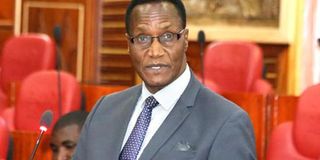Rules make it illegal to alter fees

Education Cabinet Secretary Jacob Kaimenyi before the Senate Education Committee on March 18, 2015. PHOTO | BILLY MUTAI |
What you need to know:
- No child shall have to undergo interview to join public primary school
- Schools also have to spread the fees in the ratio of 50:30:20 for the three terms in a year.
It is now illegal for public schools to ask parents to pay higher fees than that approved by the Cabinet Secretary for Education.
The newly-gazetted rules have also taken away the powers of boards of management in public schools to alter fees without written authority from the Cabinet Secretary.
The regulations were gazetted last week and give powers to the government to sue any boards of management who defy the ministry.
Cabinet Secretary Jacob Kaimenyi, gazetted the new fees structure for secondary schools in March despite opposition from teachers’ unions which termed them unrealistic. Parents support the guidelines.
The government will now provide Sh12,870 a year per student in regular schools and Sh32,600 for those in special schools.
The maximum a parent is required to pay per year is Sh9,374 for a student in a day school, Sh53,553 in boarding schools and Sh37,210 for special needs schools.
Schools also have to spread the fees in the ratio of 50:30:20 for the three terms in a year.
The regulations also state that the minimum age of admission into primary school will be six years and no child will be denied admission in school for lack of proof of age.
“A learner progressing from pre-primary school to a public primary school shall not be subjected to entry examination, any interview or admission fee,” say the regulations.” The regulations also say teachers must have been trained in a course approved or recognised by the CS and registered by the Teachers’ Service Commission.
Schools are now required to have a first-aid kit for each class and adequate, safe and clean water. They will also be required to have disability-friendly learning environment. Boarding schools must have a qualified nurse, a watchman and other suitable adult supervision.
The regulations also put a stop to forced repetition of classes unless on the recommendation of a doctor or due to non-attendance for one academic year.
“All learners who have undertaken a full course of primary education shall be eligible for admission to a secondary school regardless of their scores,” say the regulations.
It will also be unlawful for a school to compel a parent to transfer a learner to a different school without the written approval of the county director of education.
A student progressing from primary school to a public secondary school or his or her choice will not be subjected to any interview, pre-qualification examination or required to make any payment before admission.
Education officials at the county level will be required to institute affirmative action to enable learners from minority or marginalised groups or those with special needs to be admitted to secondary schools.




